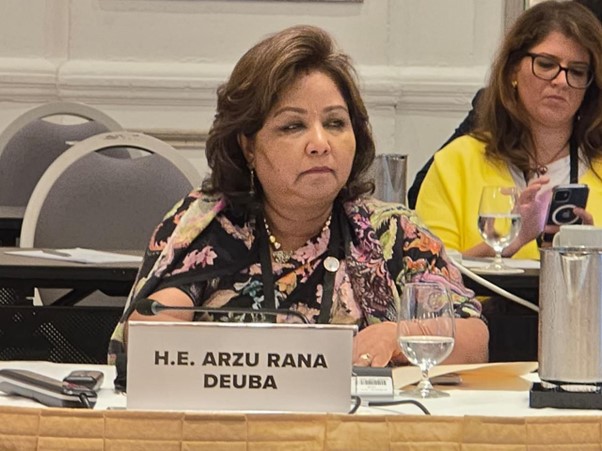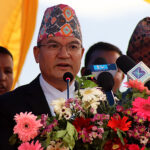Kathmandu, Sept 21:
Minister for Foreign Affairs Dr Arzu Rana Deuba said that there are still many challenges for women to reach leadership positions across political and institutional sectors.
In her address to the Meeting of World’s Women Foreign Ministers in Toronto, Canada on Friday, Minister Dr Rana said, “There are several legal provisions ensuring women’s equality and inclusive participation, and significant progress has been made. But there are still many challenges for women to reach leadership roles.”
Minister Dr Rana argued that Nepal and other third world countries are relatively facing more problems regarding gender equality and women’s rights.
She also shared global data pointing out lack of women representation in leadership: Less than 11 percent of Heads of State and 10 percent of Heads of Government are women. Similarly, 60 percent of women’s employment globally is in the informal economy, and on average, women spend around three times more time on unpaid care and domestic work than men. And, women have only 64 percent of the legal rights enjoyed by men.
Reviewing decades of global efforts, Minister Dr Rana said, “It has been 76 years since the Universal Declaration of Human Rights proclaimed equal rights for men and women. Since then, we’ve seen four UN global conferences and action plans on women; the introduction of Millennium Development Goals and Sustainable Development Goals. Now, we have six major global policy frameworks for gender equality and women empowerment. But gender parity continues to elude us. We continue to be denied equal participation and opportunities.”
In the meeting, she highlighted Nepal’s continuous fight for gender equality, resulting in improvements in the field with targeted policies and actions.
“We continue to fight for gender equality, with our target policies and programmes bringing about improvements across the board. Our Constitution mandates 33 per cent female representation in the federal and provincial assemblies, and 40 per cent in local governments. A decade into the promulgation of the Constitution, we have seen our first female Head of State, first female Speaker of the Parliament, and first female Chief Justice. We must take it positively.”
Similarly, women account for 28 percent of Nepal’s public service workforce, and security agencies have witnessed increasing women’s participation. In private sector, 29.6 percent of managers are women.
Although full gender parity has not yet been achieved, increasing female participation across fields in Nepal indicates the significant impact of gender mainstreaming, she said.
“Unfortunately, violence and discrimination against us starts right from the womb, and is justified and perpetuated throughout our lives. Therefore, efforts to address gender inequality need to be comprehensive and holistic. They need to be undertaken at all levels – from the global level to the grassroots level. For these efforts to succeed, stakeholders across the public and private sectors need to play an active role. Everyone can be a catalyst for change,” she said.
Therefore, the entire world should consider gender equality as the basis of a peaceful and prosperous world, she argued. Arguing that there is no dearth for legal provisions in the field of women’s equality and women’s rights in the world, Minister Dr Rana emphasised changes in people’s behaviour as necessary to implement those provisions.
The meeting brought together women foreign ministers from 16 countries globally, discussing a range of issues, including women’s equality and participation, development of women’s leadership, challenges of women to reach leadership roles, and misinformation and its effect on women.
RSS




